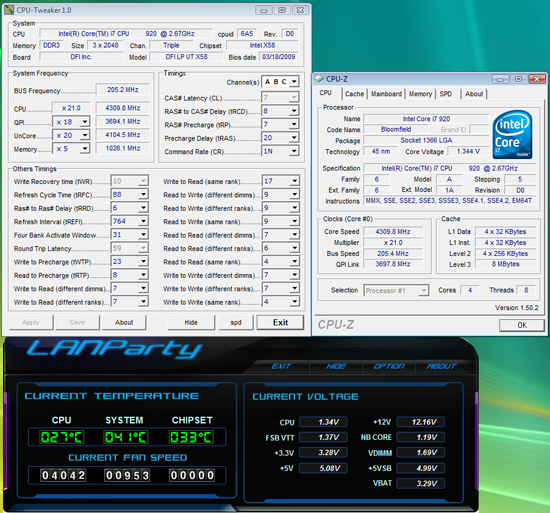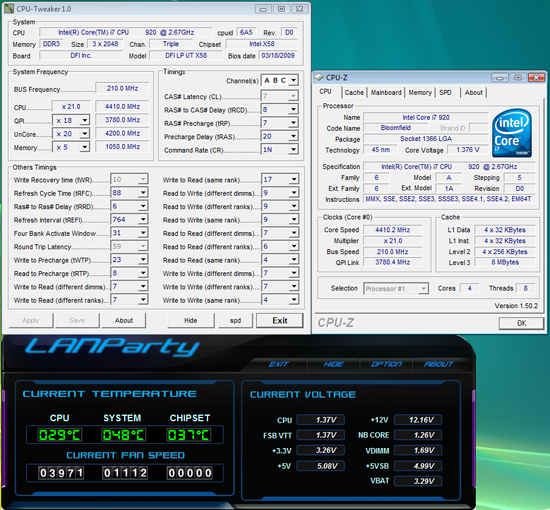Intel Core i7 920 D0 Stepping - Preview
by Gary Key on April 6, 2009 11:30 AM EST- Posted in
- Gary's First Looks
We received our first Core i7 920 D0 stepping from ASRock a few days ago and have been testing it thoroughly on their X58 SuperComputer Motherboard outfitted with four GTX 260-216 video cards. This new stepping certainly shows promise as initial clocking, voltage levels, and memory speeds were improved for the most part over our best C0 stepping. However, the differences were not exciting enough for us to immediately whip out the credit card and go hunt down a D0 stepping processor. In the middle of our testing, ASRock provided an updated BIOS tuned with the D0 stepping in mind and the results changed enough for us to seek a retail processor. Our ES sample was good, not as good as some hand picked samples we noticed at various forums back in March, but we wanted a retail processor.
We called up our good friends at TankGuys and they were able to hook us up (after our credit card cleared) with two D0 stepping 920 processors. Ben was able to overnight the first unit in time for us to test over the weekend and our initial results have just been terrific to date. Unfortunately, our ASRock X58 board (yes, this board makes for a very good multi-GPU platform) was tied up in testing for an upcoming Workstation review. So looking around the lab, we grabbed our trusty DFI LanParty UT X58-T3eH8 and updated it with the latest magical mystical BIOS from Oskar, Jarry, & Company. This particular BIOS is very D0 stepping friendly along with incorporating a few changeable settings like Round Trip Latency (RTL) that allows us to clock our Corsair Dominator GT memory kit a little higher than the other X58 motherboards.
The first test results just blew us away and we wanted to share one particular result today. We are still testing and will have a full article up in the near future featuring a variety of motherboards and cooling choices, but at this moment, the D0 920 stepping provides real and tangible benefits for the overclocking community over the previous C0 steppings. There is no difference in application benchmarks between the two processors at stock or like overclocked settings, nothing drastic has changed like cache levels or the IMC design. Rather this is a "standard continuous process improvement" update as Intel officially informed us. These improvements have enabled us to achieve higher overclocks at like or lower voltages, higher memory speeds at like or lower voltages, and as a result, our CPU, PWM, and case temperatures are down while overclocked numbers are up. Until we finish up our testing, the screenshot below is one example (not even our best) of our test results with the Core i7 920 D0 (3845B027 lot code) processor.

We enabled Turbo mode on all four cores for a final 21x CPU multiplier, set Bclk to 205, memory ratio to 2:10, Core VID at 1.345V, VTT to 1.37V, IOH to 1.19V, and VDimm at 1.69V. This resulted in a final CPU speed of 4.309 GHz, memory speed at 2052 with 7-8-7-20 1T timings, and it is 24/7 stable. We actually could reduce Core VID to 1.30V, VTT to 1.34V, and VDimm to 1.67V and pass our OCCT/Prime 95 tests. However, at the reduced voltage rates our video encoding tests with RipBot264 or HandBrake would fail along with our trusted Crysis WarHead and PCMark Vantage x64 loop testing. We think we can reduce the voltages slightly from their current settings and still pass our benchmark test suite, but for now we feel safe with our results.
The question that has not been answered yet is how our C0 processors steppings faired. First off, none of the C0 steppings we have would operate at these particular voltage settings, in fact two of them failed to POST. Our best C0 sample is requiring 1.425V on Core Vid, 1.250V IOH, 1.475V VTT, and 1.71V VDimm to just make it into Vista Ultimate 64 and we still have not dialed in application stability yet. Once we complete the C0 testing, expect to hear back from us on this new/old processor.

We just passed the eight hour test mark (multi-tasking tests, OCCT, PCMark Vantage x64 loops) with the above setup. Once again, we set our CPU multiplier to 21x for all cores, Bclk at 210, 2:10 memory ratio, and voltages set to 1.376V on Core Vid, 1.37V VTT, 1.26V IOH, along with 1.69V on VDimm. This results in a 4.41GHz clock speed and DDR3-2100 memory speed at 7-8-7-20 1T timings.
We will be back shortly with results on the ASRock X58 SuperComputer board with a new performance level BIOS as our workstation testing with it is now complete.
















51 Comments
View All Comments
tshen83 - Monday, April 6, 2009 - link
Sorry, one of the links I posted here is wrong. read the next set of benchmarks I posted.Too many benchmarks.
tshen83 - Monday, April 6, 2009 - link
Some more benchs:E5504
http://www.specbench.org/cpu2006/results/res2009q1...">http://www.specbench.org/cpu2006/results/res2009q1...
Opteron 2384
http://www.spec.org/cpu2006/results/res2008q4/cpu2...">http://www.spec.org/cpu2006/results/res2008q4/cpu2...
chizow - Monday, April 6, 2009 - link
Was HT enabled on that D0 @ 4.3GHz? Wasn't made clear from what I read, apologize if it was mentioned and I missed it.Looks great so far, these later batch i7 are great overclockers and performers! I'm very pleased with mine even though I wasn't planning to upgrade until P55/i5 or 32nm Westmere.
chizow - Monday, April 6, 2009 - link
Nm, just saw you had 8 threads in CPU-Z. In any case, that's extremely impressive with HT ON to hit 4.3GHz.Bozo Galora - Monday, April 6, 2009 - link
yeah, if you buy today you will prob get a C0. All the CPU's on the just expired MicroCenter 920's special @$200 were C0 (Maybe they were clearing em out)the tankguys.com are the only ones I am aware of who actually name and guarantee a stepping
chizow - Monday, April 6, 2009 - link
To add to this, MicroCenter actually replaced their entire stock nationally after the April 1st sale where they ran out literally across the country (I checked lol).It looks like their current batch is also all C0, as I went to my local MC that had 40-something newly in stock Saturday. They were all also C0, although pack date was mid-March.
D0 will probably start getting mixed in at retailers with high turnover, but I'd say we're still a bit off from seeing high availability. A place like Tank Guys that guarantees stepping is probably the safest followed by B&M like Fry's or MicroCenter. To clarify, you're looking for S-SPEC SLBEH for the D0.
I just installed a batch 3843A C0 and its no slouch at 3.9GHz with HT ON @ 1.32V, but its not getting to 4.3GHz. If these D0 prove to be much better clockers at low voltages, I'll probably swap one in when MC gets them in. At $230 I won't lose much on the swap by reselling the C0.
Aivas47a - Monday, April 6, 2009 - link
The code for the D0 stepping 920 is SLBEJ, not SLBEH.Furyu - Thursday, September 10, 2009 - link
Hmmm so let me guess if it says SLBCH I got screwed and have a CO?trajan - Monday, April 6, 2009 - link
Oof. I was hoping to still make the $200 sale. $230 isn't bad though. So there's no way I can tell from the box or in the store whether it C0 or D0? Thanks also to the above poster for clarifying, I didn't realize it was actually a full revision.trajan - Monday, April 6, 2009 - link
Sorry to take the first comment spot with a dumb question, but as I'm days away from picking up a 920, I have to ask.. What exactly is this C0, D0 business? Are these just manufacturing batches? That is, if I buy a 920 today, am I getting whatever is in stock? Is there anyway to tell in advance.Sorry if I'm way off the mark here :-)